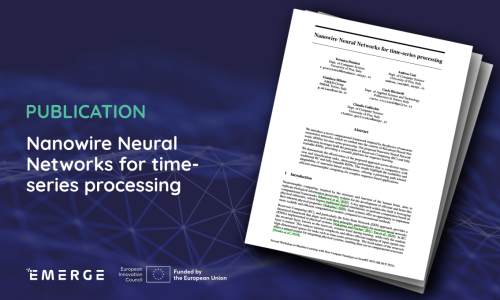14 May 2025


Neuromorphic computing, inspired by the structure and function of the human brain, aims to replicate biological information processing systems for the development of efficient and brain-like computational frameworks. A key approach within this field is leveraging physical substrates, which bypass traditional digital simulations, to perform computation based on their inherent physical properties. Such systems offer an opportunity to implement more scalable and efficient computational models compared to conventional methods.
In this work, EMERGE partners from the University of Pisa introduce a novel computational framework inspired by the physics of nanowire memristive networks, which they embed into the context of Recurrent Neural Networks (RNNs) for time-series processing. Their proposed Nanowire Neural Network architecture leverages both the principles of Reservoir Computing (RC) and fully trainable RNNs, providing a versatile platform for sequence learning. They demonstrate the effectiveness of the proposed approach across diverse regression and classification tasks, showcasing performance that is competitive with traditional RC and fully trainable RNNs. Their results highlight the scalability and adaptability of nanowire-based architectures, offering a promising path toward efficient neuromorphic computing for complex sequence-based applications.
Read the paper in the link below.


